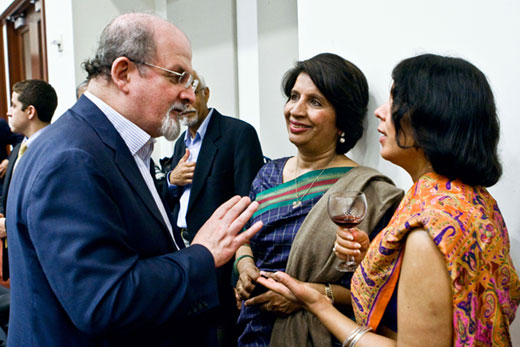The third annual India Summit, hosted by the Halle Institute for Global Learning on March 2-3 at Goizueta Business School, covered medical tourism, public health, U.S. companies doing business in India and more. Innovation was the cross-cutting theme.
In the keynote address, Nirupama Rao, India's newly appointed ambassador to the United States, praised the "initiatives Emory has taken to strengthen ties with India," specifically the India Summit.
"My view is that these people-to-people linkages create a rich mosaic of our multi-faceted relationship... beyond immediate political expediency," she said.
The evolving partnership and cooperation between India and the United States was Rao's theme. "Our two governments are engaged intensively to increase collaboration and unleash the full potential of India-U.S. innovation to address the grand challenges of the 21st century," she said.
This decade is to be the decade of innovation in India. She said India is using innovation not only as an engine of economic growth but also to address national development challenges, including:
• Energy security and clean, sustainable supplies: "One source where we are not short of supply is solar energy. Most of you who have had the opportunity to travel to India would testify to that," she said, discussing India's ambitious plan to tape the potential of available solar energy.
Rao also said, "We in India hope to benefit from your expertise in shale gas. The U.S. is helping us map our shale gas resources."
• Education: "India is one of the leading nations of origin of international students in the United States," with nearly 14 percent of all international students in the U.S. and contributing $3.1 billion to the U.S. economy. A U.S.-India knowledge initiative will create university-to-university linkages and exchanges of junior faculty, she said.
• Allowing foreign retail: While single brand retail is allowed already in India, "for multi-brand retail, we need a short period of consultation with all the stakeholders . . . The majority will have to be on board. But I think there is light at end of the tunnel."
• China: Rao thinks that a trilateral dialogue between India, China and the United States is an "idea whose time has come."
Rao concluded with "the topic I always bring up in these discussions: a need for study of India in a very deep, multi-faceted, integrated way in the U.S. in schools."
In a March 2 session on art in India, Salman Rushdie and Deepika Bahri discussed Indian art. The University Distinguished Professor and the associate professor of English discussed artists as characters in several of Rushdie's novels, particularly "The Moor's Last Sigh."
"By far the hardest thing in making up that book was to work out what [the woman artist character] Aurora's paintings would look like," he said. "But by the time I finished I felt I could paint them. I knew personally so many Indian artists among my contemporaries that it gave me the courage to make one up."
"How should we talk about art?" Bahri asked.
Rushdie said, "It's not too hard to learn the different languages (of the arts). Creative desire is what's in common, what unites the arts."
Other sessions at the summit included a panel discussion on medical tourism, moderated by Manoj Jain, adjunct professor in Rollins School of Public Health, and an interactive discussion on public health led by K.M. Venkat Narayan, Hubert Professor of Global Health and Epidemiology.
Think India Foundation's Tarun Wadhwa and Goizueta professor Benn Konsynski were in conversation on the promise and perils of India's national identity system. Saturday sessions looked at doing business for U.S. companies in India and Indian companies in the United States.
Part of the Halle Institute Speaker Series and the Knowledge Futures Initiative, the well-attended summit was also sponsored by the India China America Institute, the Indian Embassy in Washington and the Consulate General of India in Atlanta as well as a number of Emory's schools and administrative units.

